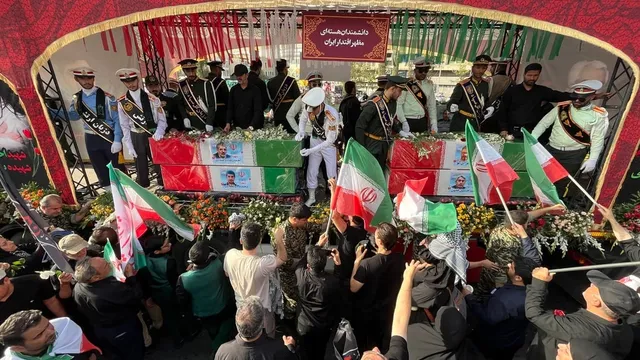
Iran conducts state funeral for military leaders killed in Israeli strikes
2025-06-29 16:44- Iran conducted a state funeral for military leaders and nuclear scientists killed during the 12-day conflict with Israel.
- Hundreds of thousands of mourners participated in the funeral ceremony held in Tehran, expressing solidarity and defiance.
- The war led to significant losses on both sides, intensifying Iran's anger toward Israel and the US.
Express your sentiment!
Insights
In the aftermath of a 12-day conflict between Iran and Israel, Iran prepared to conduct a state funeral for military leaders and nuclear scientists who lost their lives. The conflict, which escalated significantly after June 13, resulted in extensive casualties and military operations, with both sides claiming considerable losses. As the funeral was held in Tehran, hundreds of thousands of mourners gathered to pay their respects, demonstrating their anger and defiance against Israel and the United States. Many officials, including the Iranian Foreign Minister, were present, although Supreme Leader Ayatollah Ali Khamenei was notably absent from the event. The conflict began with Israel launching an operation aimed at neutralizing Iran's nuclear capabilities, as they viewed Iran's nuclear program as a significant threat. Over the course of the 12 days, Israeli forces claimed to have killed approximately 30 Iranian commanders and 11 nuclear scientists. On the other hand, Iran retaliated by launching over 550 ballistic missiles toward Israel, causing casualties and damage despite many being intercepted. The situation reignited long-standing tensions between Iran and Israel, further complicated by international engagement and diplomatic efforts. During the funeral, the mood among the Iranian public was one of mourning and anger, signaling a collective response to the losses suffered during the conflict. Authorities closed government offices to allow for public participation, and many attendees expressed sentiments of revenge against perceived aggressors. The departure of Khamenei from public view has raised questions over the regime's stability and the leadership’s future amidst growing public unrest and allegations of crackdowns on dissent. As diplomatic efforts and negotiations regarding Iran's nuclear aspirations continue to falter, the funeral served as a significant public display of the regime's resilience and the mobilization of national sentiment against external adversaries. The events exemplified both the internal challenges faced by the Iranian government in maintaining public support and the external pressures from military confrontations and international condemnation.
Contexts
The Israel-Iran conflict has significant implications for regional stability in the Middle East, an area already marked by geopolitical tensions, sectarian strife, and a complex socio-political landscape. The ongoing tensions between Israel and Iran are rooted in ideological differences, historical grievances, and strategic calculations. Israel views Iran's pursuit of nuclear capability as an existential threat, while Iran supports militant groups hostile to Israel, notably Hezbollah in Lebanon and various factions in Gaza. This adversarial relationship fuels military escalations, fosters arms races, and complicates diplomatic efforts aimed at establishing a lasting peace in the region. The stakes are further raised by the involvement of external powers, including the United States, Russia, and various Gulf states, each with their own agendas and interests that often align or conflict with those of Israel and Iran. In recent years, the conflict has manifested through proxy wars, cyber attacks, and direct confrontations. Iran has steadily increased its military presence in Syria, utilizing it as a base to launch operations against Israel, while Israel has responded with precision strikes on Iranian targets in Syria and beyond. These actions perpetuate a cycle of retaliation that not only destabilizes the immediate area but also reverberates throughout the region, exacerbating existing tensions among neighboring countries. The growing influence of Iran, particularly in Iraq and Syria, is perceived as a threat by Arab nations and has led to a realignment of alliances, with some Arab states seeking closer ties with Israel as a counterbalance to Iranian expansionism. The potential for escalation into a wider conflict looms large, especially given the volatile nature of the players involved. Both Israel and Iran are highly capable militarily, which raises concerns about miscalculations or accidental confrontations that could spiral out of control. Furthermore, the internal politics of both nations are influenced by the external conflict; leaders may feel pressure to act militarily to reinforce their domestic standing. Any significant military engagement risks drawing in regional allies and adversaries, further complicating an already tumultuous situation and potentially leading to a broader conflict that would upend regional stability. Efforts at diplomatic resolution have been hindered by deep-seated mistrust and diverging interests. Initiatives such as the Joint Comprehensive Plan of Action (JCPOA) aimed at curbing Iran's nuclear ambitions have faced significant challenges and setbacks, notably with the U.S. withdrawal in 2018. The lack of effective communication channels between Israel and Iran further exacerbates the risk of misunderstandings. As such, the international community must recognize the urgency of addressing the Israel-Iran conflict, not only for the sake of the immediate parties involved but also for the sake of regional peace and stability. Collaborative diplomatic efforts, regional dialogues, and confidence-building measures may hold the key to mitigating the risks posed by this conflict and fostering a more stable Middle East.